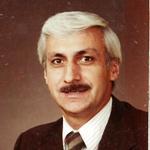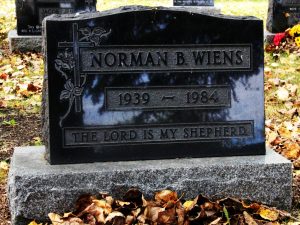
After many months of severe pain and suffering with cancer of the stomach, Norman B. Wiens passed peacefully to be with the Lord in glory at the age of 45 years and just under five months, near midnight of Christmas Eve, 1984. He will be sorely missed by his loving wife Charlotte, his sons David and Paul, and his daughter Judy and her husband Bob Siemens.
Norman was born to his parents Peter T. Wiens and Margaret Wiens as their ninth child at McTavish, near Rosenort on July 28, 1939. He received his early education at Willow Heights, a small one-room school near McTavish. Even as a lad he showed courage and compassion, and at age twelve he received a merit award for his courageous rescue of his younger brother. At the age of eighteen, he became a Christian and was baptized and received into the E.M. Church at Rosenort in 1958. On May 12, 1961 he married Charlotte Reimer; with her father P.J.B. Reimer officiating.
As a young man Norman worked for Loewen Lumber in Rosenort for some years and later also worked for Rosenort Concrete. He always had, however, a strong desire to continue his education. Subsequently, he took high school training at the Bible Institute in Steinbach and then professional teachers training at the University of Manitoba. He then taught two years in small schools in the Landmark area, before he and Charlotte moved back to Rosenort where he taught for a year. He then served as principal of the Elementary School and Collegiate of Rosenort for another seven years. After that he served as a Special Education teacher for the local school division. During these years Norman was elected as Municipal Councillor and also served as a member of the Rosenort Village Committee for some years. When the Rosenort Fellowship Chapel was organized in 1968, Norman and Charlotte became members of the new congregation and Norman served for some time as secretary of the Church Board. He was always respected and well liked in these various positions.
For a while Norman gave up his teaching career to try his hand at business in Winnipeg. Then he decided to make a radical change in his life and moved to Alberta. There he taught school in the village of Champion for three years. In 1984 he was struck by the illness that was to prove fatal. After an operation in May followed by treatments, he began teaching Special Education in Vulcan, Alberta, last fall. He was able to last only a few weeks, after which his condition again deteriorated. In November, his wife and sons brought him back to Rosenort and shortly afterwards took him to the hospital in Steinbach. There, after weeks of suffering he passed out of this life of pain, although he would have loved so much to get well again for his wife and children, especially as his young age.
Norman was predeceased by an infant sister Anna in 1930 and by his older brother John on June 21, 1951. His mother passed away on May 13, 1973, and his father on March 12, 1981.
Besides his dear wife Charlotte, and the children David, Paul and Judy with her husband Bob, Norman also leaves four brothers and four sisters with their spouses and children: Frank and his wife Eileen, Victoria, BC, Henry and Tina, Winnipeg, Albert, Vancouver, Leonard and wife Wilma, Winnipeg, sister Margaret and Harry Boss, Winnipeg, Bertha McNutt, Edmonton, Bernice and husband Dick Sawatsky, Langley, BC and Jessie, Clearbrook, BC, as well as 13 nephews and nieces.
Many other relatives and friends deeply mourn his passing. The family and relatives are deeply thankful for all the care Norman got in the hospitals and for all the sympathy that has been shown to the family in many much appreciated ways.
The funeral service will be held Friday, December 28, 1984 at 9:30 AM at the Rosenort EMC Church. Burial at the Rosenort EMC Church Cemetery.

The following tribute was written and read by his brother-in-law Al Reimer, at the funeral:
I learned to know and appreciate Norman many years ago, long before he became my brother-in-law. As a lad of eight or nine he was my pupil in Grade 3 when I was a young permit teacher in the Willow Heights School, now long gone. Norman was shy but friendly, with a quiet eagerness that made him very likeable. Above all he had a quality that in Low German we call truhaotijch – he was true-hearted, true of heart. And I believe he remained that all his life, regardless of the ups and downs he experienced in later life.
When I left McTavish at the end of that year I did not see Norm again until he became Charlotte’s fiancé and then husband. I got to know him all over again as a brother-in-law, and my liking and respect for him grew with the years. He was always comfortable to be with and I enjoyed his lively interest in such subjects as politics, education and sports. And he had lost none of his quiet intensity and the deep sincerity he brought to his own life and to the lives around him. As a family man he seemed to me exemplary, with a deep and abiding love and affection for his wife and children. He also took an active role in community affairs, especially during his years as teacher and principal here in Rosenort.
At times, however, in his quiet way, he also expressed his dreams of tying bigger things, his yearning for a career that would allow him to achieve a position of greater responsibility and influence in another, perhaps larger community. Norm was the kind of man who was never satisfied with his own achievements. He was always on the lookout for new opportunities, bigger challenges. He was a man who had much to give but who never quite found all the ways of giving what he was capable of giving. That was his personal cross; but that was also what raised him above the ordinary—the impression he gave that he was highly competent, that he was capable without trying to bring glory or recognition to himself. I think he was always a little suspicious of the kind of people who attract attention to themselves, who do things simply to gain recognition for themselves. He was always modest and self-effacing, but wanted to lead a fruitful and effective life. What he could not always find as a consistent way of achieving his personal goals.
I sincerely believe that much of Norman’s restlessness in recent years resulted from the frustration he felt because he had not managed to find an occupation and role in life he could feel comfortable with, that could match his talents and fulfill his ambitions. A lesser man would perhaps have been content to live out his life passively and meekly. Norm wanted more. And wanting more he was willing to risk more than a more prudent man would have. He was a man of great inner strength, but strength and wisdom, as we know, do not always come in equal proportions.
And then, just when he was beginning to find purpose and order in his life again, he was struck down by cancer. After surviving several difficult operations, he came home on November 9th to endure the final stages of his illness at the Bethesda Hospital in Steinbach. When Joan and I went to visit him shortly after he got there, we expected to find a patient who would be discouraged and apprehensive, perhaps bitter about the terrible thing that was happening to him. What we found was anything but a cancer victim feeling sorry for himself. Thin and sick though he was, he was joyous and triumphant. He had found his Lord and Saviour again and his whole being spoke of love and acceptance. Through his pain and suffering shone the soul of a man who had peace with God and himself, who was reconciled fully with his wife and children, his family and friends. It was a transformation that filled us with love and gratitude. He was in a state of grace, and with Charlotte at his side, he was ready to accept God’s will, although he loved life and eagerly wanted more of it.
As he approached the end he had one passionate desire, and that was to go home to Rosenort one last time, to the bosom of his family and the circle of his loving friends in the church and community. He lived to fulfill that desire. He came home, attended Church on Sunday morning and gave a moving personal testimonial that those who heard it will long remember. Then he went home and stayed there as long as he could. For ten whole days he was forced to starve his body because he could not hold food down, bus his spirit was richly fed by the love of his family and friends. It was an act of love, devotion and courage that we can all pay tribute to today.
And this also we want to engrave on our minds and hearts in honour of our departed brother; he was a fallible human being, as we all are, be he was never callous, uncaring, or indifferent to the needs of others, particularly his family. The reasons for reconciliation are never as important as the reconciliation itself. For Norm, the final reconciliation was complete, unconditional, joyous and reassuring. He went home with a loving, devoted wife and four loving children around him, and he confirmed his knowledge of that with the last silent pressure of his hand and sedation had deprived him of speech and full consciousness.
David and Paul and Judy can take comfort in having had a father who never stopped loving them and whose faith was stronger in the end because he knew what it was like to give in to human weakness. Charlotte can take comfort in having had a husband who gave her much happiness through the years and who did not fail her in the end. Norm’s passing should make us all aware of how complex and mysterious a human life is, a life that only God can comprehend fully. This husband and father died with courage and dignity; sure in the knowledge the he had found salvation and grace. By human calculations 45 may seem too young for a human life to end, but it is the right age when it is God’s will. Norman now has the surcease from suffering he craved and the eternal blessing he wanted.
Among his personal effects, Charlotte found a poem written by Norman during his unhappy period of alienation in Alberta:
I think of home again today
With heavy heart and sheer dismay,
Those joys of life that loved ones share
Are no more mine, just deep dispair.God gives us life and His desire,
Is for each soul to trust, not tire.
Our journey on life’s troubled road
Can be lightened by His ready load.Each soul bends to His command
Shall someday see the promised land;
Where pain and sorrow, hurts and care
Will never more be present there.His sole desire for men to be
Lies in the cross at Calvary.
What fools we are to even try
To run our lives alone–awry.Oh God forgive the wretched man
Who thinks he can
Improve his lot without your hand above,
To guide him with Your tender love.
